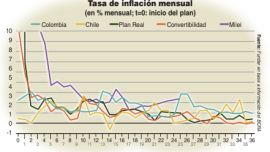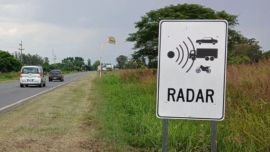The provincial legislature in La Rioja has approved the printing of the region’s own “quasi-currency,” a move that will partly cover salary payments for state workers as Governor Ricardo Quintela’s government copes with a fall in income.
With the support of Peronist lawmakers – the Partida Justicialista has 32 of 36 lawmakers – the legislature authorised the provincial government to create a quasi-currency called ‘bocade’ to the value of some 22.5 billion pesos (US$26 million at the official exchange rate).
Initially, that amount was to be lower, but shortly before the beginning of special sessions, Quintela’s administration said the amount would be increased due to inflation.
The circulation of this instrument will depend on printing times and agreements with private firms over its use.
“We’re forced to do this due to the speed, savagery and cruelty of the adjustment made in 20 days,” said Quintela, a veteran Peronist, after the move was approved by the local legislature.
"I called for special sessions and sent a bill to create financial instruments, either virtual or physical, to be able to help,” the governor explained.
Governor Quintela has been one of President Javier Milei’s most vocal critics of late. Rebukes have escalated since it emerged that provincial governments would suffer a sharp drop in federal revenue-sharing funds.
Milei has sent a draconian austerity plan to cut public spending by five percent of GDP, including severe cutbacks in the funds sent to provincial governments.
Friction
In recent days, the issue of quasi currencies has generated friction between the provincial and national administration.
“Welcome provincial currencies to the competition,” commented Milei wryly in a post on the X social network as he reacted to the news.
“To think that during the campaign they said I was crazy for suggesting a system with free competition of currencies and now they’re launching it,” added the president, who is currently in Davos, Switzerland, attending the World Economic Forum.
The population of La Rioja is around 380,000 people, from a country of 46.6 million inhabitants. Its economy is based on agricultural production, mining, tourism and agroindustry, mainly oils, sweets and wine.
Sixty-five percent of full-time registered workers in the region are employed by the state, according to government data.
Under the new law, 30 percent of state salaries will be paid in bocade.
Nothing new
In Argentina, several provincial governments have a history of creating “quasi-currencies” for everyday use, not least La Rioja.
In 1985, when former president Carlos Menem served as provincial governor, La Rioja issued provincial bonds to pay part of the salaries of public employees. The bonds were redeemable on demand and circulated at par with the austral.
When Argentina adopted ‘convertibility’ and introduced peso-dollar parity in 2001, amid a deep economic crisis, then-governor Ángel Maza decided to issue provincial bonds once again.
Most quasi-currencies, trading well below their nominal value, were absorbed by the state in 2004, but on Wednesday, Milei warned that regional administrations thinking of taking the plunge that they would “in no way be rescued by the national government.”
The La Rioja provincial government links the printing of its new bocade currency to the lack of response by Milei’s government to an outstanding debt claim to the tune of some 9.3 billion pesos (US$10.8 million) that is now before the Supreme Court.
– TIMES/NA/PERFIL/AFP



















Comments